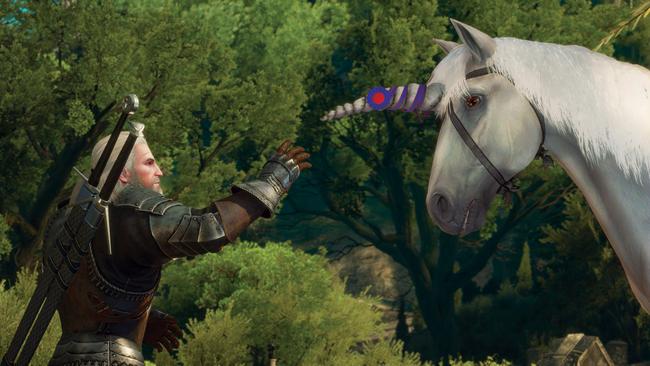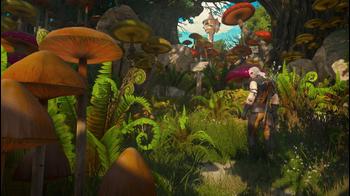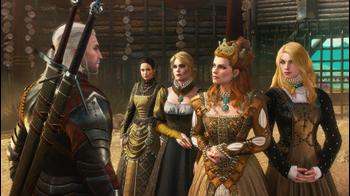CD Projekt Interview: Talking the end of The Witcher and the future of RPGs
With the release of The Witcher 3's Blood and Wine expansion just a couple of days ago, CD Projekt RED is now officially done with The Witcher and the adventures of Geralt of Rivia - at least for now. A proud RPG powerhouse who once handed out badges at E3 proclaiming, "We are rebels" and "Play your role," the studio now has an exciting time ahead forging new adventures in a new world.
In a recent visit to the studio we had a chance to sit down with Patrick Mills, a quest designer on The Witcher 3 and a member of CD Projekt with a history at Obsidian, another major RPG studio, to chat about the Witcher's success and its surprising gains in Asia through to trends in and the future of the RPG genre at large.

RPG Site: So, The Witcher 3 has been out for a while now, you're launching your second and final expansion and say goodbye to the game... how do you feel about its success? Is that daunting at all, as you prepare to move on to a new project?
Patrick Mills: It has! There is a certain... menace to that, almost. First off, it's like 'oh, well you'd better make sure your next thing is as good!' And the question always is, well, can we? Y'know, I think we can, but it means we really have to... we can't slack off. We have to keep our game up. It's going to be interesting, the next few years, as I think that we have changed things. I heard that there was a conference at a major publisher that specifically mentioned 'We're gonna start doing things the way The Witcher 3 does them'. It'll be interesting to see what things that they come up with that we'll then have to take from them or improve on what they do so that we can maintain our edge.
I mean, ah... we're gonna have to play a lot of games over the next few years just to make sure that we know what they're up to!
RPG Site: Something that really impressed me about The Witcher 3 was the fact that you actually topped the charts in Japan release week, something quite rare for Western RPGs. Do you feel like those barriers are falling?
Patrick Mills: Having a good game is key, of course, but I think we owe a lot of that also to our localization department - they're just phenomenal. I'm continually impressed with them, it just blows my mind. Even the fact that it's all written in Polish, and then localized to English, and then from English to everything else -- and yet, it's still so good in all of those languages. I don't know how they do it. It seriously blows my mind.
This company got started in localization, and for a long time that was the main thing that they did. So, they know how to do it, and they know that localization is the key to opening new markets. It's the thing that lets you go into a place like Japan, that's been resistant to certain types of games coming out of the West, and say 'Hey, look, we made this, and we made this just for you'.
Y'know, if people play a game and it feels foreign, you're limiting your market right away. You're limiting your audience. Most people don't watch foreign moves, they don't play foreign games, they don't want to turn on the subtitles. They want it to speak to them in their language, their culture, their time and their place, to make it relevant to them. I think that's something our localization team does very, very well.
RPG Site: The Witcher 3 was obviously the first foray into a truly open world for this team. How do you feel it went, and how do you feel the shift towards open world environments is impacting the RPG genre at large?
Patrick Mills: Well, I'm gonna turn that back around on you a bit - because I think that what we've done with this open world stuff is a matter of technology and design in some ways catching up to the past. My model for The Witcher 3 has always been Ultima 7. I don't know if you've ever played Ultima 7, but... you go back, you look at Ultima 7. It's still one of the best open-world games ever made. You can go anywhere, you can do anything, and I think with Witcher 3 we've taken some things from that. It's nice for me, because that's my favorite game of all time. When I suddenly realized - when I moved on to Witcher 3 and started doing stuff, I suddenly realized 'Oh, this is Ultima 7...!'
Of course it doesn't have all the features of Ultima 7, but it's got other features that Ultima 7 didn't, obviously. In some ways, we're catching up to the past, actually. I think that with the technological innovation over the past couple of decades, some things from the early and mid 90s actually got lost in that innovation and now processors have caught up. With the tools we have now and all that, we can go back and start doing the things that were done then but with a modern level of presentation; I'm very excited about that.
RPG Site: In a game of this size and from your perspective of quest design, how do you decide on the depth of the side stuff versus the story critical path? How much do you think there should be to each? Something that's significantly changed is that gamers are on average older now than a few decades ago, with more personal commitments and the like.
Patrick Mills: I think this is the paradigm that's developing now. The main content - the main, core storyline that appears in games like this... it's going to get shorter. But we're going to be putting more and more effort into that side content. If you look at the metrics for Witcher 3, a lot of people play the Bloody Baron quest, then they're done, y'know? They may play all of those quests out in Velen, but they never get any further in the main story.
I think that the paradigm that this industry and specifically RPGs is going to be looking at in the future is shorter main stories so that everyone completes the main story - but then you opt in to the rest of the surrounding story. You decide how much time you want to invest. These games will continue to be a hundred-plus hours long, but if you just want to sit down and play this thing, you've got maybe 20 to 30 hours of main story and then 80 hours of side content.
Personally for me, as someone who really likes side content... I like it, I like this idea. [laughs]
RPG Site: Is there anything you see on the horizon for the genre, or gaming in general, that particularly excites you as an RPG developer and an RPG fan?
Patrick Mills: That is... a very good question, and unfortunately a question that I don't have a lot of answers for. I think that none of the main spaces of gaming are going to go away in the near future. I hear people talk about the death of the PC, the death of the console market, or mobile is gonna take everything over... I just think we're going to have a continued proliferation of platforms, rather than one thing taking over.
I think that VR may be the next platform. I don't know how much cross-platform is going to happen with VR - I'm not convinced of that - but I am convinced that VR is a very interesting platform. We had a demo here not too long ago and I strapped that thing on and said 'Holy shit! This is something new, this is something very interesting'. So I'm very interested to see what develops on VR with RPGs.
The thing that we do here, with Triple-A RPGs... it's really sort of a cross between Hollywood and genre fiction and pen and paper games, all sort of blended together. What can VR add to that? I'm as interested as you to know what the future holds, and I'm very excited for the next decade or so.

